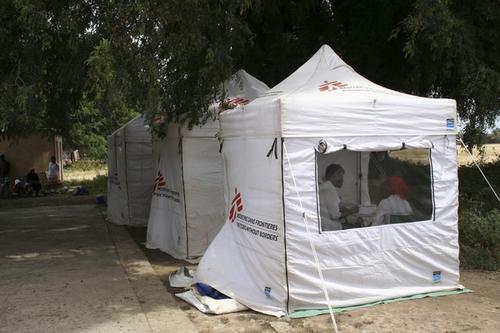Johannesburg – A medical team from Médecins Sans Frontières, (MSF) has been responding to the health needs of displaced people for nearly a week now since violent xenophobic attacks in the KwaZulu Natal (KZN) province. The team provides basic medical care following needs assessments at three displacement camps, housing more than 5,000 people around the coastal city of Durban. A second team will soon conduct similar assessments in the Ekurhuleni region near Johannesburg.
The team of six in KZN started work on Tuesday, 14 April. They are focused on immediately providing for the unmet medical and humanitarian needs of fearful migrants and refugees who have fled their homes during the violence. People in the camps are predominantly from Mozambique, Malawi, Zimbabwe and the Democratic Republic of Congo.
The MSF team is actively providing medical and water sanitation services to three camps (Isipingo, Chatsworth and Phoenix) coordinating closely with the provincial Department of Health (DoH) to ensure regular mobile clinics twice weekly for consultations and treatment, ensuring referrals to hospitals and providing medication for chronic conditions like HIV and TB. The team’s objective is to provide support where gaps in the response are identified for medical care, water and sanitation services and help for survivors of sexual and gender-based violence, while supporting elements of improved camp management.
“We have seen children with diarrhea, fever, skin diseases and a case of pneumonia. We have also treated men who had been badly injured in the violence but had not tried to get care because they were too scared to go hospital or leave the camps with assistance,” says Dr Gemma Arellano, MSF emergency team leader in KwaZulu Natal.
“In Chatsworth Camp, one man suffered fractured ribs in an attack 14 days ago, but he was too scared to seek help. Despite the pain, even today, he does not want to go a hospital for fear of being targeted again,” says Arellano. “In Phoenix Camp, we treated a man who had multiple arm fractures. Only three hours earlier, he had been severely beaten by a mob of 15 men. They threw him into the river after the attack, but he managed to survive. We have seen pockets of violence targeting individuals,” says Arellano.
The number of displaced people in each camp is based on estimates by our team since camp managers were not able to do routine population registrations initially. The MSF team reports that buses have started to arrive to repatriate people back to Malawi, Mozambique and Zimbabwe.
Phoenix Camp (situated about 26km north of Durban)
Phoenix Camp is growing rapidly – and currently hosts an estimated 2,500 people, including 600 people who have been moved from other camps.
MSF is assisting by providing water and sanitation management, installing a 1,500 litre water tank to increase the clean water supply from only two shared taps. The team is also determining the medical needs of camp residents based on medical profiling when people are registered. The team is focusing on preventing risk of waterborne disease by supplying soap and water as well as buckets for washing. They are also focused on the needs of pregnant women, and children under five years-old. Medical needs for people with HIV and TB are also being monitored and the DoH will be reestablishing access to ARV medication inside the camp.
Chatsworth Camp (situated about 20km north of Durban)
There are currently an estimated 3,500 people in Chatsworth camp which is filled to capacity. Around 20% of the camp population consists of children under five-years-old who are particularly vulnerable.
MSF will be supplying mobile clinic services in the camp supplementing the DoH services. The MSF medical team will also coordinate closely regarding nutritional screenings and since many of the children may not have been vaccinated against measles, an immunization campaign will be done soon.
Isipingo Camp (situation about 21km south of Durban)
Isipingo Camp was the first camp established and is home to approximately 400 people. The primary problems identified in the initial assessment were related to access to primary healthcare and psychosocial needs.
MSF urges reintegration – don’t protract camps
MSF is does not support a protracted situation of displacement camps for foreign nationals.
“MSF urges that community reconciliation between the displaced and South Africans should commence immediately to de-escalate the tensions and reduce fears. This could allow displaced people to safely return to their homes, if they wish, and ensure that reintegration back into South African society can begin. The South African authorities have the capacity to respond to the current emergency but reconciliation and reintegration efforts must not fall by wayside,” says Andrew Mews, MSF head of mission for South Africa and Lesotho.
Additional responses
MSF remains concerned about rising tensions and our teams in other South African cities (Johannesburg, Rustenburg and Cape Town) are monitoring the situation and collaborating with civil society groups and communities to denounce the violence and reconciliation activities.
In Johannesburg MSF is assembling a second team tasked with conducting medical assessments in the coming days in Ekurhuleni and elsewhere where displaced people have sought safety.
MSF commends the courage with which the majority of South Africans are standing up against xenophobia through the actions of faith-based organisations, civil society groups and individuals mobilizing support to stop the violence and show solidarity with displaced foreign nationals.
In Malawi, Mozambique and Zimbabwe, three of the six southern African countries where MSF currently runs routine HIV and TB projects, our teams there are on stand-by in case local governments express a need for support as some of their nationals start arriving after repatriation actions.




